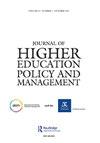Learning to ‘tell China’s story well’ : higher education policy and public diplomacy in Chinese international education
IF 2.4
3区 教育学
Q1 EDUCATION & EDUCATIONAL RESEARCH
Journal of Higher Education Policy and Management
Pub Date : 2023-10-16
DOI:10.1080/1360080x.2023.2269499
引用次数: 0
Abstract
ABSTRACTTaking the Learning to ‘tell Chinese’s story well’ narrative prevalent in policies as a starting point, this article draws on data collected from a provincial university and delves into the institutional involvement and support in response to the state’s international higher education policies. By foregrounding the underlying structures of power and control, I illustrate the mechanisms by which the policy was translated into and implemented through the practice of the hidden curriculum – an integrated approach of ‘listening’, ‘watching’ and ‘telling’ at the meso level, where international students’ aspirations were shaped (or not). This ‘implementation study’ offers a valuable contribution to the growing scholarship of recent policy studies, especially in the Chinese context, and thus adds to understandings about how the official discourse becomes integral to mid-level institutions’ routine and everyday practices and processes. The implications of China’s experiences and the direction of further study are discussed.KEYWORDS: Education policyinternational studentsChinahigher education‘tell China’s story well’public diplomacy Disclosure statementNo potential conflict of interest was reported by the author(s).Additional informationFundingThis work was supported by the Ministry of Education of the People’s Republic of China – Centre for Language Education and Cooperation (general project) [grant number: 22YH45C].学会“讲好中国故事”:中国国际教育中的高等教育政策与公共外交
摘要:本文以政策中普遍存在的“讲好中国故事”的说法为出发点,以一所省级高校的数据为基础,探讨了高校在应对国家国际高等教育政策中的参与和支持。通过强调权力和控制的潜在结构,我说明了通过隐性课程实践将政策转化为和实施的机制——一种在中观层面上的“听”、“看”和“讲”的综合方法,在中观层面上形成(或不形成)国际学生的愿望。这一“实施研究”为近期政策研究中不断增长的学术研究做出了有价值的贡献,特别是在中国背景下,从而增加了对官方话语如何成为中层机构日常和日常实践和过程中不可或缺的一部分的理解。讨论了中国经验的启示和进一步研究的方向。关键词:教育政策留学生中国高等教育“讲好中国故事”公共外交披露声明作者未报告潜在的利益冲突。本工作由中华人民共和国教育部语言教育与合作中心(一般项目)资助[批准号:22YH45C]。
本文章由计算机程序翻译,如有差异,请以英文原文为准。
求助全文
约1分钟内获得全文
求助全文
来源期刊

Journal of Higher Education Policy and Management
EDUCATION & EDUCATIONAL RESEARCH-
CiteScore
5.30
自引率
7.70%
发文量
52
期刊介绍:
The Journal of Higher Education Policy and Management is an international journal of professional experience and ideas in post-secondary education. It is a must read for those seeking to influence educational policy making. The journal also aims to be of use to managers and senior academic staff who seek to place their work and interests in a broad context and influence educational policy and practice.
 求助内容:
求助内容: 应助结果提醒方式:
应助结果提醒方式:


